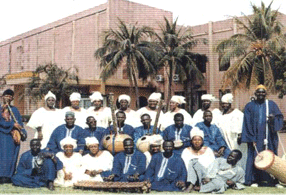Jazz is a music genre that originated in the African-American communities of New Orleans, Louisiana, in the late 19th and early 20th centuries, with its roots in blues, ragtime, European harmony and African rhythmic rituals. Since the 1920s Jazz Age, it has been recognized as a major form of musical expression in traditional and popular music. Jazz is characterized by swing and blue notes, complex chords, call and response vocals, polyrhythms and improvisation.

Martinique is an island in the Lesser Antilles of the West Indies, in the eastern Caribbean Sea. A part of the French West Indies (Antilles), Martinique is an overseas department and region and a single territorial collectivity of the French Republic. It is a part of the European Union as an outermost region within the special territories of members of the European Economic Area, and an associate member of the CARICOM, but is not part of the Schengen Area or the European Union Customs Union. The currency in use is the euro.
Jazz fusion is a popular music genre that developed in the late 1960s when musicians combined jazz harmony and improvisation with rock music, funk, and rhythm and blues. Electric guitars, amplifiers, and keyboards that were popular in rock began to be used by jazz musicians, particularly those who had grown up listening to rock and roll.
The music of Guadeloupe encompasses a large popular music industry, which gained in international renown after the success of zouk music in the later 20th century. Zouk's popularity was particularly intense in France, where the genre became an important symbol of identity for Guadeloupe and Martinique. Zouk's origins are in the folk music of Guadeloupe and Martinique, especially Guadeloupan gwo ka and Martinican chouval bwa, and the pan-Caribbean calypso tradition.

The music of Mali is, like that of most West African nations, ethnically diverse, but one influence predominates: that of the ancient Mali Empire of the Mandinka. Mande people make up around 50% of Mali's population; other ethnic groups include the Fula (17%), Gur-speakers 12%, Songhai people (6%), Tuareg and Moors (10%).
Latin jazz is a genre of jazz with Latin American rhythms. The two main categories are Afro-Cuban jazz, rhythmically based on Cuban popular dance music, with a rhythm section employing ostinato patterns or a clave, and Afro-Brazilian jazz, which includes samba and bossa nova.

Aimé Fernand David Césaire was a Francophone Martinican poet, author, and politician. He was "one of the founders of the Négritude movement in Francophone literature" and coined the word négritude in French. He founded the Parti progressiste martiniquais in 1958, and served in the French National Assembly from 1945 to 1993 and as President of the Regional Council of Martinique from 1983 to 1988. He was also the Mayor of Fort-de-France for 56 years, from 1945–2001.
Afro-Cuban jazz is the earliest form of Latin jazz. It mixes Afro-Cuban clave-based rhythms with jazz harmonies and techniques of improvisation. Afro-Cuban music has deep roots in African ritual and rhythm. The genre emerged in the early 1940s with the Cuban musicians Mario Bauzá and Frank Grillo "Machito" in the band Machito and his Afro-Cubans in New York City. In 1947, the collaborations of bebop trumpeter Dizzy Gillespie and percussionist Chano Pozo brought Afro-Cuban rhythms and instruments, such as the tumbadora and the bongo, into the East Coast jazz scene. Early combinations of jazz with Cuban music, such as "Manteca" and "Mangó Mangüé", were commonly referred to as "Cubop" for Cuban bebop.

Amadou & Mariam are a musical duo from Mali, composed of the Bamako-born couple Amadou Bagayoko and Mariam Doumbia (vocals).
Afro rock is a style of rock music with African influences. Afro rock is a dynamic interplay between Western rock music and African musical elements such as rhythm, melodies and instrumentation. Afro rock bands and artists in the late 1960s and early 1970s included Osibisa, Assagai and Lafayette Afro Rock Band.
Marie-Claire Mboyo Moseka, known professionally as M'bilia Bel, is a Congolese singer and songwriter. Dubbed the "Queen of African Rumba" and "Queen Cleopatra", she is regarded as one of the most influential figures in 20th-century Congolese and African popular music. Her music is a blend of traditional Congolese rumba, soukous, rap, and zouk, with lyrics that often delve into themes of love, politics, hedonism, militancy, jealousy, sentimentality, and education.
Cathy Rosier was a model and actress born in Martinique, French West Indies. She died in Marrakech, Morocco, from a ruptured aorta.

Manou N'Guessan Gallo, is a West African singer, bandleader and musician of African popular music, playing the electric bass guitar.

Henri Wittmann is a Canadian linguist from Quebec. He is best known for his work on Quebec French.

Peste Noire are a French black metal band from La Chaise-Dieu, France. The band was formed by "La sale Famine de Valfunde", also known simply as "Famine", in 2000. Their music uses standard black metal elements mixed with traditional Gallic instrumentation, and influences from genres like punk and electronic music. The band is sometimes referred to as P.N. or K.P.N.

Sébastien Charlier is a French diatonic harmonica player. He plays chromatically, in all keys, on a single blues harp. His music is inspired by many different influences, from blues to jazz, from fusion to electro-pop. He has also written two textbooks: Je débute l'harmonica and Méthode en poche harmonica.
Bridget Jones was a British literary academic who pioneered the inclusion of Caribbean literature in European university studies programs. While teaching French literature at the University of the West Indies, Jones developed an interest in French Caribbean writing and developed one of the first PhD curricula focused on francophone Caribbean literature. Upon returning to England, she taught at the University of Reading and the Roehampton Institute. An annual award, distributed by the Society for Caribbean Studies, as well as a scholarship program, given by the University of the West Indies, are named in her honour.

Kareyce Fotso is a Cameroonian singer who performs around the world and in various styles, including Afro pop, blues and mangambeu.

Gaël Octavia (29 December 1977 in Fort-de-France, is a French writer and playwright. She is also a film director and painter.
Jacqueline Quentin Louison or J.Q. Louison is a writer and poet from Martinique.










